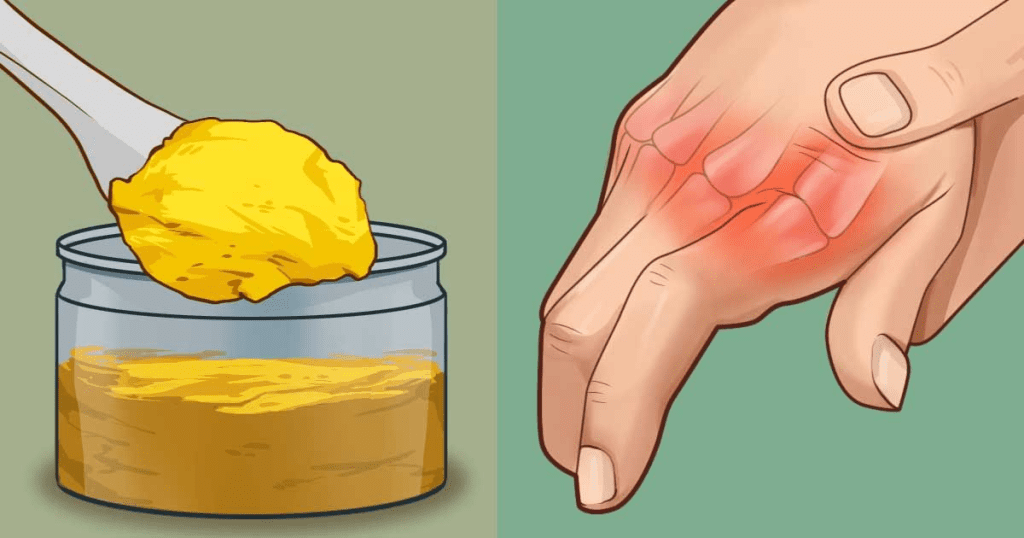You’ve probably heard of turmeric as the bright, yellow spice commonly used in Indian curries. But did you know it’s also a powerful natural remedy? For over 4,500 years, turmeric has been used in Ayurvedic medicine to treat various ailments, thanks to its anti-inflammatory, antibacterial, and antioxidant properties. The secret behind turmeric’s potency lies in its active ingredient, curcumin, which boasts impressive health benefits. Let’s dive into eight remarkable ways turmeric can support your health and wellness.

1. Heals Cuts and Wounds Naturally
Turmeric’s curcumin is a powerful anti-inflammatory, antibacterial, and antiviral agent, making it a great remedy for cuts and wounds. When applied topically, turmeric can prevent bacterial infections, reduce inflammation, and promote faster healing by encouraging new skin cell growth.
To use turmeric for wound care, sprinkle turmeric powder directly on the affected area. For added benefits, you can mix it with linseed oil or a ginger paste to reduce pain and inflammation. This natural treatment is ideal for minor cuts, burns, and scrapes.
2. Treats Acne and Acts as a Natural Facial Cleanser
Turmeric isn’t just a spice; it’s also a fantastic natural skincare ingredient. Thanks to its antifungal and antibacterial properties, turmeric can help combat acne and prevent breakouts. When combined with other ingredients, it can serve as a powerful facial cleanser.
Create a simple turmeric face mask by mixing ¼ teaspoon of turmeric powder with ¼ teaspoon of neem oil (or organic milk if neem oil isn’t available) and a few drops of lavender oil. Apply the mixture to your face and leave it on for about 30 minutes before rinsing. This can help reduce acne scars and leave your skin feeling smooth and refreshed.
3. Reduces Inflammation Throughout the Body
Curcumin is known for its anti-inflammatory properties, making turmeric a go-to remedy for chronic inflammation. It’s been used to alleviate conditions such as rheumatoid arthritis, Crohn’s disease, and even gingivitis.
One of the best ways to incorporate turmeric into your anti-inflammatory routine is by drinking turmeric tea. To make it, simply boil 4 cups of water with a teaspoon of ground turmeric. Let it simmer for 10 minutes, strain, and enjoy. Adding a bit of ginger can give it an extra kick to help further reduce inflammation.
4. Fights Against Cancer Cells
Studies have shown that curcumin has powerful anti-cancer properties. Research suggests that it may help kill cancer cells and prevent their spread, particularly in cancers of the breast, bowel, stomach, and skin.
Turmeric can be applied topically to treat skin cancers by mixing turmeric powder with a small amount of Vaseline or coconut oil. Apply this mixture to the affected area three times a day. Not only can it reduce itchiness and odor associated with ulcerated skin cancers, but it also helps in healing lesions.
5. Eases Psoriasis Symptoms

Psoriasis is an autoimmune condition that causes red, itchy, and scaly skin. While there is no known cure, turmeric can help alleviate some of the symptoms. Studies have shown that curcumin can reduce inflammation and decrease the severity of psoriasis.
For a soothing topical treatment, simmer a mix of one part turmeric and two parts water until it forms a thick paste. Apply this paste to the affected areas, let it dry, and then rinse off. This natural remedy can bring relief from itching and discomfort, and it may improve the appearance of the skin over time.
6. Treats Eczema and Moisturizes the Skin
Eczema sufferers often experience dry, cracked, and irritated skin. Turmeric, when combined with coconut oil, can help soothe and hydrate the skin while reducing inflammation and redness.
To create a simple eczema treatment, mix a small amount of turmeric with organic virgin coconut oil. Apply the mixture to the affected area daily. Many people report seeing visible improvements in just a few days, making this a fantastic natural option for managing eczema flare-ups.
7. Boosts Oral Health and Hygiene

You might be surprised to learn that turmeric is beneficial for oral health. Its antimicrobial and anti-inflammatory properties make it an excellent natural remedy for gum disease and plaque prevention. Studies have shown that turmeric mouthwash can be as effective as store-bought products in preventing gingivitis and plaque buildup.
To make a simple turmeric mouthwash, stir a teaspoon of turmeric powder into warm water. For added flavor, you can mix in a few drops of peppermint oil. Alternatively, create a turmeric toothpaste by combining 1 teaspoon of turmeric, ½ teaspoon of salt, and ½ teaspoon of mustard oil. Brush as usual, and enjoy the benefits of a cleaner, healthier mouth.
8. Reduces Signs of Aging and Enhances Skin Health

Turmeric has powerful antioxidant properties that can help combat the effects of aging. By protecting skin cells from damage and promoting collagen production, turmeric can reduce the appearance of wrinkles and age spots.
For a rejuvenating skin treatment, mix 1 tablespoon of chickpea flour, ¼ teaspoon of turmeric, and 2 teaspoons of milk. Apply the mixture to your face and let it sit for about 10 minutes. Gently rinse off with lukewarm water to reveal brighter, more youthful-looking skin. This face mask can be used regularly as part of an anti-aging skincare routine.
Conclusion: Embrace the Power of Turmeric for Health and Wellness
Turmeric’s benefits extend far beyond its culinary uses. From healing wounds to reducing inflammation and improving skin health, turmeric is a versatile, powerful natural remedy. By incorporating this spice into your daily routine—whether in food, as a supplement, or in homemade treatments—you can experience its healing properties firsthand. So go ahead, embrace the ancient wisdom of turmeric, and enjoy a healthier, more vibrant life.


